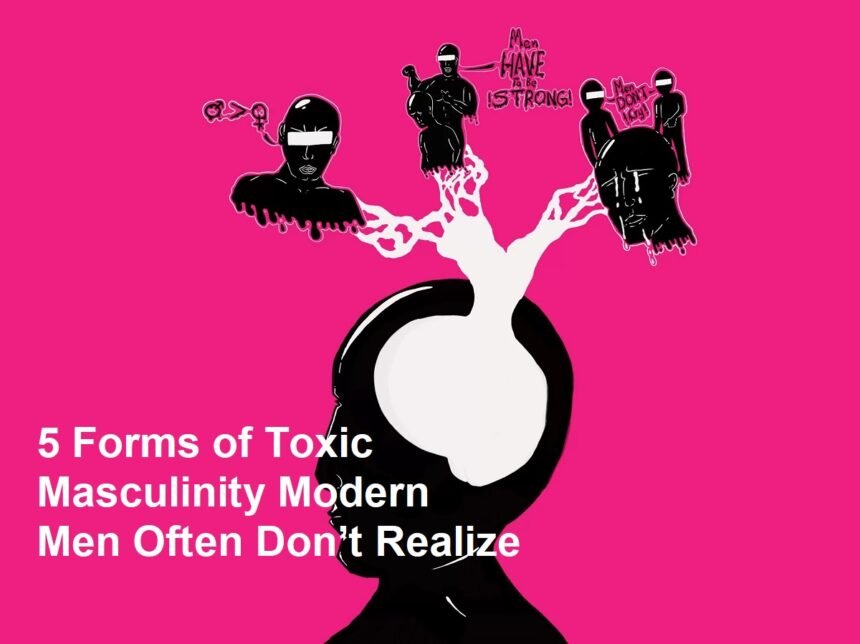Introduction
Masculinity itself isn’t a bad thing. Strength, responsibility, and leadership can all be positive traits. The problem begins when cultural pressures push men into extreme or rigid roles — this is what experts call toxic masculinity.
In today’s world, many men may not even realize they’re carrying these patterns. In this article, we’ll unpack the 5 forms of toxic masculinity modern men often don’t realize, share expert explanations of toxic masculinity, and even discuss the so-called “benefits” that sometimes keep these behaviors alive. Most importantly, you’ll get practical tips on how to break free and create healthier relationships with yourself and others.
Understanding Toxic Masculinity
Expert Explanation of Toxic Masculinity
According to sociologists and psychologists, toxic masculinity refers to a set of cultural norms that pressure men to behave in ways that suppress emotions, prioritize dominance, and reject vulnerability. These norms can harm not only men themselves but also those around them — including family, partners, and society.
For example, the belief that “real men don’t cry” may seem harmless, but it actually discourages emotional expression, leading to stress, poor mental health, and difficulty connecting with others.
Why Toxic Masculinity Persists
The Misunderstood “Benefits” of Toxic Masculinity
It’s worth noting that toxic masculinity persists partly because of the perceived “benefits.” For instance:
- Acting tough can create a sense of control or respect.
- Avoiding vulnerability may feel safer than risking rejection.
- Being competitive can sometimes bring career or social rewards.
However, these so-called benefits are short-term and come at a high cost: emotional isolation, damaged relationships, and even health problems.
5 Forms of Toxic Masculinity Modern Men Often Don’t Realize
Let’s break down the five common forms that many men unconsciously practice.
1. Suppressing Emotions
From childhood, many boys are told not to cry or show weakness. As adults, this often turns into emotional suppression.
Why it’s harmful: Bottling up emotions can lead to stress, anxiety, and strained relationships. People around you may feel disconnected because they never see the “real” you.
Tip to overcome: Practice expressing feelings in small, safe ways — journaling, talking to a friend, or even seeking therapy.
2. Equating Worth with Financial or Career Success
Many men grow up believing that their value is tied to how much they earn or how successful they appear.
Why it’s harmful: This mindset creates pressure, guilt, and burnout. It can also make men feel like failures when they face normal financial struggles.
Tip to overcome: Redefine self-worth by valuing kindness, presence, and relationships just as much as professional success.
3. Viewing Vulnerability as Weakness
For many, admitting fear, sadness, or confusion feels impossible. Society has taught them that vulnerability equals weakness.
Why it’s harmful: Avoiding vulnerability prevents genuine connections. It also increases loneliness and emotional distance in relationships.
Tip to overcome: Start small by sharing honest feelings with trusted people. Remember: vulnerability often strengthens bonds, not weakens them.
4. Normalizing Aggression or Dominance
Some men still believe that being “manly” means being aggressive, dominating conversations, or always being the decision-maker.
Why it’s harmful: This form of toxic masculinity can damage personal and professional relationships. It also discourages collaboration and mutual respect.
Tip to overcome: Practice active listening and empathy. Strength doesn’t always mean dominance — often, it’s about self-control.
5. Rejecting Anything “Feminine”
From hobbies to career paths, many men avoid anything labeled as “feminine” out of fear it might make them appear weak.
Why it’s harmful: This limits self-expression and personal growth. It also reinforces gender stereotypes that harm everyone.
Tip to overcome: Explore activities without labels. Enjoy cooking, art, or caregiving roles if they bring you joy. Real strength is living authentically, not living by rigid rules.
Building Healthier Masculinity
Breaking free from toxic masculinity doesn’t mean rejecting masculinity altogether — it means redefining it in a healthier, more balanced way.
Try these steps:
- Surround yourself with people who encourage openness.
- Educate yourself with books, podcasts, and expert insights on gender and mental health.
- Challenge old stereotypes whenever you catch yourself or others reinforcing them.
Conclusion: Your Turn to Reflect
These 5 forms of toxic masculinity modern men often don’t realize are deeply ingrained, but recognizing them is the first step toward change. By letting go of toxic patterns and embracing healthier masculinity, you’ll not only improve your own mental well-being but also strengthen your relationships and community.
Now it’s your turn: Have you ever caught yourself or others practicing one of these patterns? How did you deal with it? Share your story in the comments, and don’t forget to pass this article along — your experience might inspire someone else to grow.












